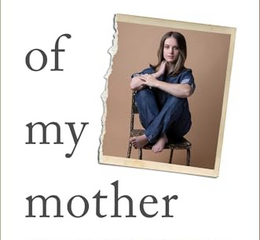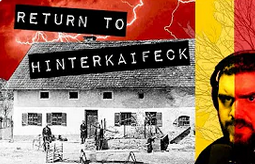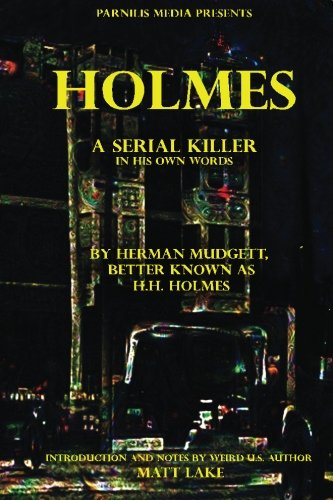
True Crime Studies: A Serial Killer in His Own Words by H.H. Holmes
More Videos
Published
4 years agoon
By
Rachel RothHave you ever heard a terrible liar, and I mean Pinocchio terrible, try to worm their way out of a bad situation? The way they stumble over their lies until they can’t keep them straight anymore, struggling to weave together a story that doesn’t make a whole lot of sense. It’s painful to listen to and even more painful to read. I read this and asked myself, what the heck is this? Was infamous serial killer H.H. Holmes, master manipulator, on something when he wrote this laughable attempt at both a memoir and a self-defense statement or was there just no editor in the prison? Either way, he would’ve had better luck trying his hand at fiction because that’s basically what this is.
This isn’t the only book written by a criminal, a serial killer, and I doubt it’ll be the last. There is something about such a description, “a killer in their own words” that is impossible to resist. It allows people to get even closer, whilst keeping a safe distance, to men and women the world has perceived as evil and gives them the opportunity to potentially dissect just a fraction of their minds. H.H. Holmes, John Wayne Gacy, David Berkowitz, Jack Unterweger, etc. These are all convicted killers that have used literature to try and change public perception of them with various degrees of success. Jack Unterweger, convicted of murdering a prostitute in 1976 was actually triumphant when he wrote his autobiography titled Fegefeuer Oder Die Reise Ins Zuchthaus (Purgatory or the Trip to Jail – Report of a Guilty Man). In the book, Unterweger explains his actions with a sob story about an abusive mother. The story was so compelling that it actually managed to change the state’s mind and he was released on parole in 1990. Unfortunately for young women in that area, it didn’t take long for him to start dropping bodies and he was arrested again in 1994.
A counter to Unterweger is John Wayne Gacy who had much less luck with his memoir A Question of Doubt in 1993. Although both books feature the killer in question trying to prove their innocence they are very different in execution and style. Gacy’s method of defense was to try and create a conspiracy theory about his conviction and blamed his crimes on other killers that the police were not prosecuting. A Question of Doubt didn’t do anything other than become a morbid collector’s item for true crime devotees.
H.H. Holmes falls somewhere in the middle. Not in public perception but in the method at which he writes his own memoir/defense story and it is probably the most ridiculous, bewildering, nonsensical narrative that a man on trial for murder could ever create. It’s so bad that just confessing would have made him look better. Holmes: A Serial Killer in His Own Words makes absolutely no sense. It should be taught in schools on how NOT to write or to lie. It’s not that the explanations he gives don’t make sense, although most are far-fetched, but that they’re written as if he loses track of them within moments of writing them down. There is a part in the book where he admits to having a body stashed in his hotel room but it’s for the purpose of a life insurance scam that’s ruined when a cop busts in. He tricks the cop into leaving then convinces the other hotel residents that the cop was actually a robber. He then puts the body in a trunk and lugs it around for a few days. This is an actual scene in the book that quickly moves on to something else completely unrelated.
While I was reading this I was torn between laughing and reaching through the pages all the way through to Holmes’ prison cell and ripping that pen away from him. Maybe slap him around a bit.

Herman Webster Mudgett, better known as Dr. Henry Howard Holmes “H. H. Holmes,” was an American serial killer best-known for the so-called “Murder Castle” that he built in 1887 and had up and running during the World’s Columbian Exposition set in Chicago in 1893. Built to kill people, the Castle had soundproofed rooms and mazes of hallways, some of which seemed to go nowhere, and sections that were designed to be nothing but death traps. It is widely believed that he had killed hundreds of people in this building, but not only was Holmes a murderer, he was also big a fan of insurance fraud. This guy probably scammed more women and business owners than one person in history, often in the laziest of ways, and he actually uses his time as an insurance hustler as a crutch while making up his defense in A Serial Killer in His Own Words.
Erik Laron’s The Devil in the White City explores much of this in great detail if anyone is interested (great book).
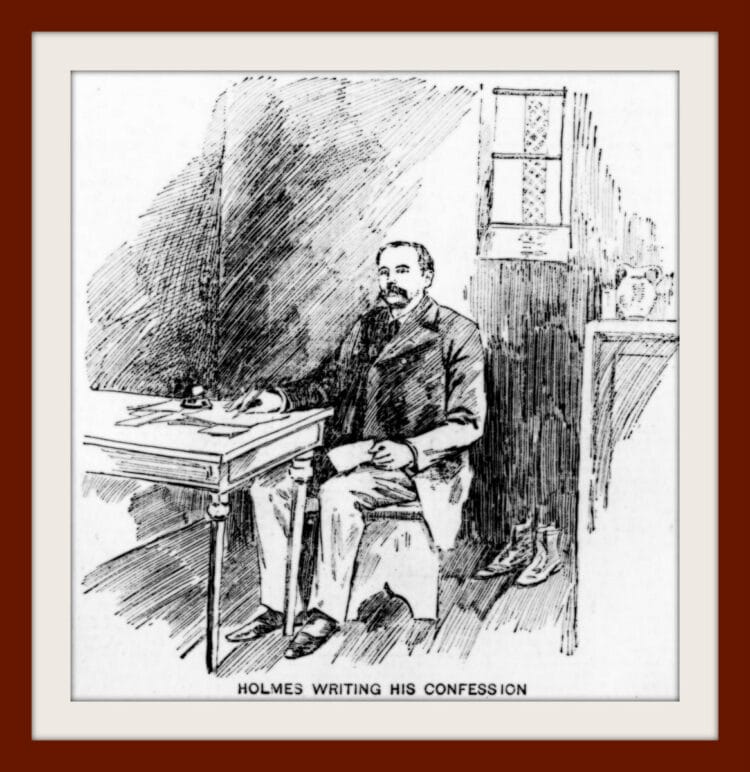
When Holmes was arrested on November 17, 1894, he immediately started on the numerous contradictory claims that would dictate his post-arrest life. His time in prison was relatively short as he was put to death just two years later, but for a large portion of that time, he worked at trying to prove his innocence. He picked up a pen and started writing the “truth” only no two accounts matched. His confessions changed constantly and often made little sense. As time went on, his claims started to morph into something resembling self-damnation as he’d later change his stance on innocence, deciding that he was pure evil, a man possessed by the devil. He claimed to be so vile and demonic that he was starting to resemble Satan in the face.
Such statements would normally accompany feelings of remorse or fear of death as the accused realizes that they’re coming closer to their execution. However, that was not the case for Holmes. Despite the admission of guilt and saying that he was possessed against his will, he remained oddly calm upon his arrival at the gallows.
If I could call A Serial Killer in His Own Words anything, it would be a study on mental deterioration, compulsive liars, and the psychopathic process of emotions. Throughout the chapterless passages that run across Holmes’s childhood and youth, there is a vain attempt at mimicking emotion and sympathy. In the beginning, Holmes takes a moment to briefly describe his parents and childhood but it is rushed and empty. Everything else he takes his sweet time talking about, but the one section of time that most people always stop to reminiscence about, he speeds past with a fast “my parents were lovely people” comment and leaves it there. As he describes himself as a boy, everything feels a bit hollow because I believe that he’s trying to imagine what the readers will think is sympathetic, but is unable to put himself in that mindset.
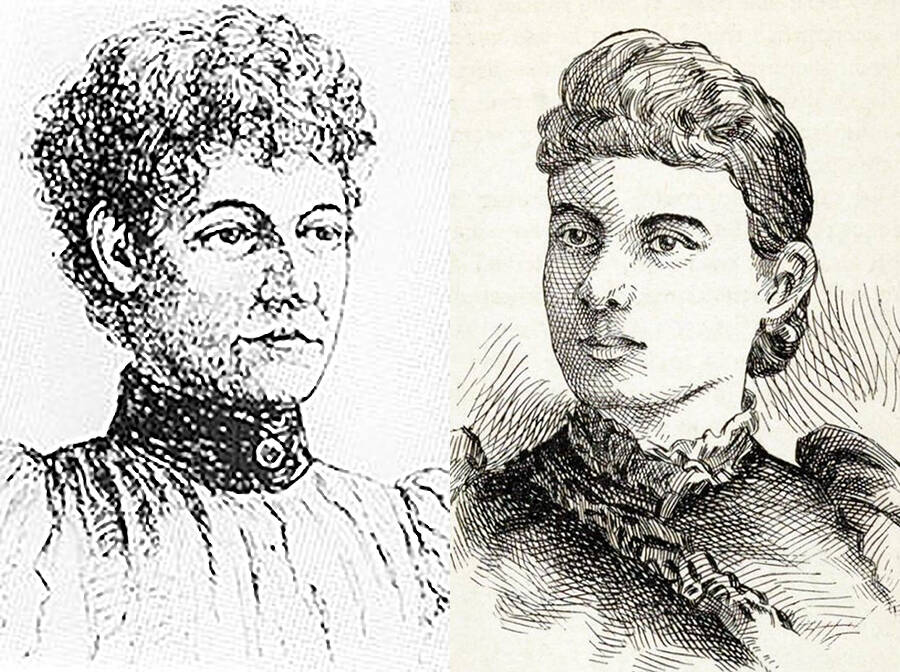
Once rushing past boyhood, you can tell we’ve reached the point in his life that he is most proud of. His medical accomplishments, education, the way he easily charms women, we get so much of this that it’s almost unbearable. One by one, Holmes meets the future victims that he claims he either hardly knew or cared for deeply and had no idea what happened to them, and again, we get more of the mimicry. Minnie and Nannie Willaims are two women, victims, that Holmes claims to care for and even love to some extent. However, the way he writes them, you can tell he doesn’t. He can’t wait to get past their section and get back to himself, which he does very quickly. The story of the Williams sisters, which ended in tragedy in real life, ends without a proper conclusion in Holmes’s narrative. He jumps around them, moving them around in the story so that he can clear his name while also not waste time talking about them and the result is a whole lot of bad writing.
I know this man was a serial killer, a monster even by the worse of standards but honestly, after reading A Serial Killer in His Own Words the man has lost the ominous allure as a study topic. This book could be adapted into a spoof movie about serial killers. That’s how ridiculous it is. Before, the man known as H.H. Holmes was on par with something demonic. He built this murderous castle, killed people beyond anything that can be called impulsive or pleasurable but as if that was the only thing his hands knew how to do, and his presence on this Earth felt ominous. Even after his death, his hotel was rumored to be cursed, with those who knew him touched by evil. However, after reading this, he no longer seems as such. As weird as it sounds, this almost ruins the shadow he casts over the city he once haunted because now when I think of him, I can only think of a guy that was incapable of telling a series of lies well enough to make sense. Plus, the stories he made up tells me that he probably read whatever the equivalent of cheesy detective novels was back then.
 (2.5 / 5)
(2.5 / 5)
Related posts:
- True Crime Studies: Philip Carlo’s ‘The Night Stalker’ is graphic nightmare fuel
- True Crime Studies: Naming Jack the Ripper by Russell Edwards
- True Crime Studies: “A Bird in Your Hand” is probably the borest true crime book I’ve ever read
- True Crime Studies: Another side of Ted Bundy is shown in Elizabeth Kendall’s ‘The Phantom Prince.’
Rachel Roth is a writer who lives in South Florida. She has a degree in Writing Studies and a Certificate in Creative Writing, her work has appeared in several literary journals and anthologies. @WinterGreenRoth

You may like
Book Reviews
The Hotel: We’ll All Be There Soon.
Published
2 months agoon
March 17, 2025By
C M ReidDaisy Johnson’s, The Hotel is a collection of stories that tell the tale of a hotel built on cursed land. Originally written and recorded as a series for BBC Radio 4 in 2020, (you can find the recordings here https://www.bbc.co.uk/programmes/m000mrcg/episodes/player )
The fourteen-story collection was released in hardcover in 2021. Johnson’s prose is haunting, weaving together the stories of generations of families who have been tempted, forced, or serendipitously dumped at The Hotel. Most leave the message, “I’ll be there soon,” and many disappear from room 63.
- ‘The British literary heir to Stephen King’ Johanna Thomas-Corr, Sunday TimesA triumph of contemporary horror from the Booker Prize-shortlisted author, this collection of short stories will haunt you long after you turn the final pageA place of myths, rumours and secrets, The Hotel looms over the dark Fens, tall and grey in its Gothic splendour
- Built on cursed land, a history of violent death suffuses its very foundations –yet it has a magnetism that is impossible to ignore
- On entering The Hotel, different people react in different ways
Last update on 2025-03-17 / Affiliate links / Images from Amazon Product Advertising API
The Plot.
The Hotel tells the stories of the people who are drawn to The Hotel, or, more accurately, the ground the hotel is built on. The first story explains what we know about the hotel, its tendencies, moods, and … hobbies. We are then introduced to Mary Southgraves, ‘The Witch’, who comes to live with her husband on the land on which The Hotel will be built. The villagers in the pond drown her for predicting a sickness that takes the village children, (no this is not a spoiler she tells you she dies on the first page of her chapter.)
The proceeding chapters build upon this story. We meet the workers who are brought in to fill the pond to begin construction. A child of a guest in 1968 who meets another girl who may or may not actually be there. A maid who takes part in séances and Ouija board sessions. The stories progress through time into the present.
Highlights.
The haunting prose of The Hotel does the majority of the heavy lifting for this collection, which makes sense since it began as a podcast series. Johnson’s prose leans towards poetry, albeit more Poe than Keats.
The repetition of specific characters and family names throughout the different stories was intriguing, giving the stories links. These links trigger a sense of recognition for the reader. There is also a sense of anticipation, knowing what has happened to these families already, we wonder how much more they can withstand. The Hotel is like a curse following these families, but I think Johnson is commenting on lineage and the consequences of past actions. The sins of the father and all that.
- Fifteen highly original and darkly unsettling supernatural stories, performed by some of Britain’s finest actresses ‘This is what we know about The Hotel
- It is bigger on the inside than on the outside
- Do not go into Room 63
Last update on 2025-03-17 / Affiliate links / Images from Amazon Product Advertising API
Drawbacks.
These stories can get confusing at times and I think this is due to the briefness of the stories. It’s hard to keep track of a character that you have spent four pages with and remember them three stories later. I found myself having to stop and turn back to check if that person was who I thought they were. This pausing to turn back interrupts the reading experience. It pulls you out of the story and destroys the atmosphere that Johnson has worked to create.
The Final Take.
The Hotel was an interesting read. Johnson is a talented writer who has published a collection of linked stories that will keep the reader turning pages if only to find out the final fate of these families. That being said, it is obvious that the stories were initially written for a podcast. I’m not sure if it’s the way they are put together or… I don’t know, there’s just something ‘podcasty’ about them. As such I would recommend listening to the audio episodes (see the link above) over reading the book.
 (3 / 5)
(3 / 5)
On Halloween in 2016 Josh Malerman, author of Bird Box, released A House At The Bottom Of A Lake (gosh this is a hefty title!). Last week, I picked this slim book up off my library’s Adult Horror shelves, not knowing what to expect. What I got was a novella that should have been shelved in the teen lit section. Perhaps it is the rather weird underwater sex scene that precludes it from those shelves.
- From the New York Times bestselling author of Bird Box and Malorie comes a haunting tale of love and mystery, as the date of a lifetime becomes a maddening exploration of the depths of the heart
- “Malerman expertly conjures a fairy tale nostalgia of first love, and we follow along, all too willingly, ignoring the warning signs even as the fear takes hold
- ”—Lit Reactor The story begins: young lovers, anxious to connect, agree to a first date, thinking outside of the box
Last update on 2025-03-10 / Affiliate links / Images from Amazon Product Advertising API
The Plot.
When James asks Amelia out on a date during summer break, canoeing was the last thing that she expected. Borrowing his uncles canoe, James hopes he can show Amelia an exciting time, because he really likes this girl! The date starts well and the conversation, if stilted at times, is banter-ey and cool.
They head out on the first lake, but James has an idea that they might have a better time on the lake that joins to this one. It is quieter, no speed boats to show him up, they’ll be able to eat their picnic lunch in peace and quiet. When they arrive, though, they notice a tunnel, that may lead to a third lake. Eager to show Amelia that he is an exciting kind of guy, James heads through the tunnel.
Lo and behold, it is another lake! Albeit, a bit murky and deserted, but that’s alright. That is until they notice that beneath the bow of the boat is a tiled roof. Beneath that tiled roof is a whole house. What ensues is a summer of falling in love and exploring a sunken house that may not be as empty as they thought.
Highlights.
Malerman writing the internal monologue of an angsty seventeen-year-old on a first date is one of the most authentic things I’ve read for a long time. Even down to James worrying about revealing that his dad owns the hardware shop he works in. Scared that Amelia will think that is all he is going to do with his life.
The ending (which of course I cannot discuss here) was well done, although a little contrived and predictable. It felt as if it had been almost tacked on the end as an afterthought. Perhaps Malerman finished the story without the final chapter, but was encouraged to add that last bit to give readers some closure
- “A book that demands to be read in a single sitting, and through the cracks between one’s fingers
- There has never been a horror story quite like this
- Josh Malerman truly delivers
Last update on 2025-03-10 / Affiliate links / Images from Amazon Product Advertising API
Drawbacks.
Malerman is a good writer, we have seen this in the many novels he has released since Bird Box. A House At The Bottom Of A Lake did not meet the usual standard. There are many reasons I say this. The first is a lack of creativity in descriptive passages in this book. They all felt pretty drab and began to become repetitive by the end of the story. I don’t know how many, times Malerman compared the way that James and Amelia were moving under the water in their scuba suits as ‘Astronaut-like’ or ‘Astronaut-esque’ or ‘ Like he was walking without gravity’, but really can you find another comparison please because this one is all used up!
As I mentioned in the intro, this did feel like a YA novel. Not only because both of the main characters are seventeen, but the prose is a too simple to be engaging. A House A The Bottom Of A Lake might be marketed differently in Australia (where this humble reviewer lives), perhaps making it to the YA shelves in the US or UK, but this is definitely not adult horror.
The Final Take.
Josh Malerman is a favorite of mine. I tend to pick up his books, blurb unread, because I will generally enjoy what he is putting out there. The exception to this rule is A House At The Bottom Of A Lake (if I never have to type that title again I will be pleased!). It just didn’t hit the way his other novels have and I was disappointed.
 (2 / 5)
(2 / 5)
Imagine this. You’re home alone, waiting for your partner to return, when you hear a knock on your door. You answer it to see a family of five, bundled up against the cold. The father, a kindly older gentleman, explains that he used to live in this house as a boy. And he would love to show it to his family.
Do not let them in.
The story
Released in June 2024, We Used To Live Here is author Marcus Kliewer’s debut novel. It tells the story of Eve, who just purchased a beautiful house with her partner, Charlie. Their plan is to flip the house and sell it.
One night, while waiting for Charlie to come home, Eve is surprised by a knock at the door. It’s a man named Thomas Faust and his family.
Thomas explains that he grew up in the house and hasn’t been in the area in years. Would Eve let them in so that he can show the home to his children?
Against her better judgment, Eve lets them in. She regrets this almost at once when Thomas’s daughter vanishes somewhere into the house.
What worked
I always appreciate a book that allows you to play along with the mystery. And this book does that better than just about any other I’ve seen.
Pay close attention to the chapters, to the words that aren’t there. To everything about this novel.
This is mostly down to Kliewer. This is ultimately his work of art. But the production value is also fantastic. I don’t want to ruin the multiple mysteries, so I’ll just say this. There are clues in this book that require some specific artistic choices in the page layouts in this book. And I loved that.
If you’d like to experience another horror book review, check out this one.
We Used To Live Here is also the kind of story that makes you question everything right along with the main character, Eve. Eve is a great main character. But she might be an unreliable narrator. She might be experiencing every single horror described, exactly as it’s described. Or, she might be having a psychotic breakdown. Through most of the book, we can’t be sure. And that is so much fun.
Finally, the weather plays a large part in this story. There are several stories in which the weather or the land itself could be considered a character. Even an antagonist. This is certainly one. The winter storm is the thing that traps the family in the house with Eve. It also makes escaping the home difficult. Reading this book during the winter was especially impactful. Most of us know what it feels like to be shut in by a storm. I’ve personally lived through some of those storms that are just referred to by their year, as though they were impactful enough to claim the whole 365 days for themself. And that was with people I liked. Imagine what it would feel like with strangers. It’s a staggering thought and one that we explore in depth in this book.
- Get Out meets Parasite in this eerily haunting debut and Reddit hit—soon to be a Netflix original movie starring Blake Lively—about two homeowners whose lives are turned upside down when the house’s previous residents unexpectedly visit
- As a young, queer couple who flip houses, Charlie and Eve can’t believe the killer deal they’ve just gotten on an old house in a picturesque neighborhood
- As they’re working in the house one day, there’s a knock on the door
Last update on 2025-03-08 / Affiliate links / Images from Amazon Product Advertising API
In the end, We Used To Live Here is a fantastic book. It’s the sort of story that sneaks into your brain and puts down roots. And if this is just the first book we’re getting from Kliewer, I can’t wait to see what else he comes up with.
 (5 / 5)
(5 / 5)

